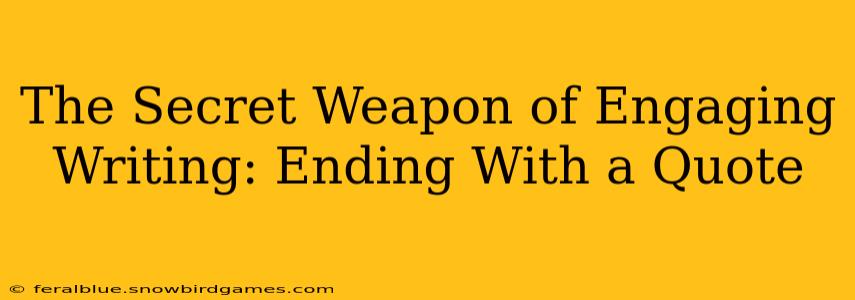Want to leave a lasting impression on your readers? Consider the power of ending your writing with a quote. It's a secret weapon that can elevate your work from good to unforgettable, boosting engagement and leaving your audience pondering long after they've finished reading. This isn't about randomly tacking on a famous saying; it's about strategically selecting a quote that perfectly encapsulates the essence of your piece, providing a resonant and memorable conclusion.
Why End With a Quote?
The effectiveness of ending with a quote stems from several key advantages:
-
Enhanced memorability: A well-chosen quote acts as a powerful mnemonic device. Readers are more likely to remember a striking phrase than a lengthy concluding paragraph. The quote sticks in their minds, reinforcing your message long after they've put down the piece.
-
Added weight and authority: A relevant quote from a respected figure lends credibility and authority to your writing. It suggests that your ideas are supported by established thought leaders or experts in the field.
-
Emotional resonance: Quotes often tap into universal emotions and experiences. Ending with a quote that evokes a specific feeling can create a stronger emotional connection with your audience, fostering a more meaningful reading experience.
-
Elegant closure: A well-placed quote provides a graceful and satisfying conclusion, avoiding the awkwardness of a rushed or abrupt ending. It acts as a neat bow tying up the loose ends of your writing.
-
Stimulating further thought: A thought-provoking quote can encourage your readers to continue reflecting on the themes and ideas presented in your piece, fostering deeper engagement and understanding.
Choosing the Right Quote: A Strategic Approach
Not just any quote will do. The selection process is crucial. Here's how to choose a quote that effectively elevates your writing:
-
Relevance is paramount: The quote must directly relate to the central theme or argument of your piece. It shouldn't feel forced or tacked on as an afterthought.
-
Consider the tone: The tone of the quote should align with the overall tone of your writing. A humorous quote wouldn't be appropriate for a serious or somber piece, and vice-versa.
-
Author credibility matters: While not always necessary, choosing a quote from a respected author or expert adds weight to your conclusion.
-
Brevity is key: Keep it concise. Long, rambling quotes can detract from the impact. A short, punchy quote is far more effective.
-
Test it out: Before settling on a quote, read your piece aloud with different options to see which one resonates most effectively.
Common Mistakes to Avoid
-
Overusing quotes: Don't rely on quotes as a crutch. They should enhance your writing, not replace it.
-
Choosing irrelevant quotes: A quote that doesn't connect with your piece will seem jarring and out of place.
-
Ignoring proper attribution: Always cite the source of your quote, showing respect for the original author and maintaining academic integrity.
How to Integrate Quotes Seamlessly
Don't simply drop the quote in. Introduce it smoothly, providing context and explaining its relevance to your writing. You can use phrases like:
- "As [Author's Name] eloquently stated,..."
- "[Author's Name] captures the essence of this perfectly with the observation,..."
- "This idea is beautifully summarized by [Author's Name]:..."
Examples of Effective Quote Endings
Imagine an article about overcoming adversity. Ending with a quote like, "The oak sleeps in the acorn; the bird waits in the egg; and in the highest vision of the soul a waking angel stirs. Dreams are the seedlings of realities," by James Allen, would leave a powerful and inspiring impression. The quote's imagery and message perfectly resonate with the article's theme.
What are some examples of famous quotes that are often used to end speeches or essays?
Many famous quotes work well as concluding statements depending on the subject matter. Examples include quotes by Winston Churchill, Martin Luther King Jr., and Nelson Mandela, each known for their powerful and inspiring rhetoric. The key is to select a quote whose message aligns with your central argument.
What are some tips for making sure the quote fits the overall tone and style of your writing?
Ensure the quote's style matches the overall tone of your writing. A formal essay needs a formal quote, while a casual blog post might use a more informal, conversational quote. The quote's vocabulary and sentence structure should blend seamlessly with your writing style.
How can I find the right quote to end my piece of writing?
Start by identifying the core message or theme of your writing. Then, brainstorm keywords related to that theme and search for quotes using online resources like Goodreads, Quote Investigator, or BrainyQuote. Consider the author's credibility and the overall impact of the quote on your reader.
In conclusion, ending your writing with a thoughtfully chosen quote is a potent technique for enhancing engagement and leaving a lasting impact on your readers. It's a subtle but powerful tool that can elevate your writing to new heights. So, next time you're crafting a piece, consider the art of the concluding quote – it may just become your secret weapon too.

